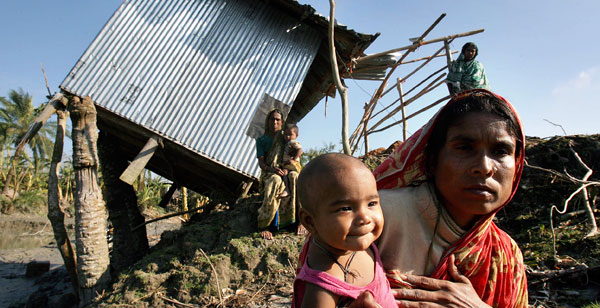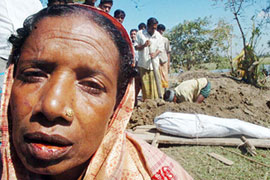Bangladeshi resilience tested
The country will take years to recover from Cyclone Sidr.

 |
| Millions are without homes and livelihoods following the powerful storm [AFP] |
Battered and bruised by Cyclone Sidr, Bangladesh will take years to rebuild shattered lives in its devastated regions, experts say.
Keep reading
list of 4 itemsTurtles swimming to extinction in Malaysia as male hatchlings feel heat
Could shipping containers be the answer to Ghana’s housing crisis?
Thousands protest against over-tourism in Spain’s Canary Islands
The high-velocity storm bore down on the impoverished country last week, leaving swaths of death and destruction in its wake.
Already more than 3,000 people have died and the toll is still rising. The loss to livestock and property has also been huge.
Most Bangladeshis living along the affected coastline are poor and struggle to make ends meet.
“The storm has pauperised them further,” says Rashed Chaudhry, a Dhaka-based journalist.
Tough tasks
Getting them up on their feet will be a long and arduous task, and the job in hand goes beyond simply rescuing survivors and delivering relief.
“Bangladesh is definitely in for a long haul,” says Chaudhry.
Basanta Kar, a disaster expert from neighbouring India, agrees: “Every disaster requires a long-term solution.”
 |
| More than 3,000 people have died and the toll is rising [AFP] |
Rising from the storm’s rubble is growing unanimity that Bangladesh will have to heal both the physical and emotional scars left on its survivors.
The task is made infinitely more difficult by the storm’s scale and spread.
The numbers are daunting: millions have been affected, thousands of houses have been destroyed, and countless numbers have been robbed of their livelihood.
Add to this the widespread damage to the infrastructure – breached roads, broken bridges and uprooted electric poles among others – the government will have its hands full to restore normality in the worst-affected regions.
It is all easier said than done; rescuers are still unable to reach some inaccessible regions, struggling along in rickety boats bobbing up and down the country’s turbulent rivers.
Five days after the storm made landfall, Omar Farooq of Care Bangladesh, an aid agency, could only survey the damage and shake his head in dismay in one of the remote islands of Sunderbans.
“No help has reached yet. The devastation has been near total, with people losing many family members and almost their entire livestock,” Farooq told Al Jazeera.
Long-term challenges
Delivering relief in the immediate aftermath is proving difficult, but long-term reconstruction and rehabilitation to rebuild homes, restore livelihoods and heal emotional trauma in the remote regions is sure to prove a greater challenge.
Farmers need to be provided with seeds and young livestock, fishermen across a wide area will have to be given boats and nets.
One of the
|
The best way forward for Bangladesh would be capacity building among its communities” Saroj Kumar Jha, programme manager, World Bank’s Global Facility for Disaster Reduction and Recovery |
best illustrations of how hard it is going to be is, perhaps, the task of replacing the trees uprooted by the storm.
For every tree to be regenerated, about 100 saplings would need to be planted; after years of nurturing, only one would ultimately grow to replace the tree that was lost.
To recreate a lost forest which provided people with livelihoods, millions of saplings and a sustained effort will be required.
Saroj Kumar Jha, programme manager of the World Bank’s Global Facility for Disaster Reduction and Recovery, says: “The best way forward for Bangladesh would be capacity building among its communities.
“The greater capacity and resources the communities have, less vulnerable are they to calamities.”
In strengthening its communities, Bangladesh would need to have a sound, strong and sensible strategy.
“Post-disasters, the focus universally is always on brick and mortar, sand and clay,” points out Kar. “Infrastructure is rebuilt, but lives still remain scarred and empty.”
Grave pitfalls
Other trademark dangers lurk after every disaster and Bangladesh is not immune from any of them.
|
Your Views |
|
“Tragedies like this happen quickly and take so much time to recover” Rezasantorini, Chicago |
International media attention is fickle and as its focus shifts from one big event to another, foreign aid could dry up and Bangladesh might be forced to fend for itself.
The country will also almost certainly have to contend with human instincts such as greed that invariably surfaces at the scene of disasters.
The stronger and the mightier would seek to corner the aid, at the cost of those who are comparatively weak and meek.
The politics of aid is also likely to be an unwanted distraction.
Those in positions of power are prone to helping only those who they see as their constituents; the beneficiaries need not necessarily be among the needy.
Last Thursday, when Cyclone Sidr came hurtling through Banglasdesh, man was pitted against nature and man lost.
If Bangladeshis lose the reconstruction and rehabilitation plot, it will go down as abject surrender.